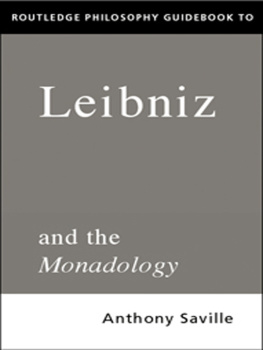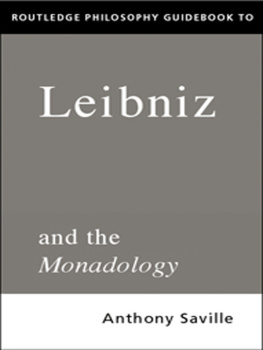Routledge Guides to the Great Books
The Routledge Guidebook to Jamess Principles of Psychology
The Routledge Guidebook to Jamess Principles of Psychology is an engaging and accessible introduction to a monumental text, first published in 1890, that has influenced the development of both psychological science and philosophical pragmatism in important and lasting ways. Written for readers approaching William Jamess classic work for the first time as well as for those without knowledge of its entire scope, this guidebook not only places this work within its historical context, it provides clear explications of its intertwined aspects and arguments, and examines its relevance within todays psychology and philosophy.
Offering a close reading of this text, The Routledge Guidebook to Jamess Principles of Psychology is divided into three main parts:
Background
Principles
Elaborations.
It also includes two useful appendices that outline the sources of Jamess various chapters and indicate the parallel coverages of two later texts written by James, an abbreviated version of his Principles and a psychological primer for teachers. This is essential reading for anyone who wants to understand this influential work.
David E. Leary is University Professor Emeritus and Dean of Arts and Sciences Emeritus at the University of Richmond, U.S.A.
THE ROUTLEDGE GUIDES TO THE GREAT BOOKS
Available:
Augustines Confessions
Catherine Conybeare
Aquinas Summa Theologiae
Jason T. Eberl
Kierkegaards Fear and Trembling
John A. Lippett
Mills On Liberty
Jonathan Riley
Einsteins Relativity
James Trefil
Gramscis Prison Notebooks
John Schwarzmantel
Thoreaus Civil Disobedience
Bob Pepperman Taylor
Descartes Meditations
Gary Hatfield
Hobbes Leviathan
Glen Newey
Galileos Dialogue
Maurice A. Finocchiaro
Wittgensteins Philosophical Investigations
Marie McGinn
Aristotles Nicomachean Ethics
Gerard J. Hughes
Heideggers Being and Time
Stephen Mulhall
Hegels Phenomenology of Spirit
Robert Stern
Lockes Essay Concerning Human Understanding
E. J. Lowe
Platos Republic
Nickolas Pappas
Wollstonecrafts A Vindication of the Rights of Woman
Sandrine Bergs
Forthcoming:
Smiths Wealth of Nations
Maria Pia Paganelli
Berkeleys Three Dialogues
Stefan Storrie
A full list of titles in this series can be found at www.routledge.com/The-Routledge-Guides-to-the-Great-Books/book-series/RGGB
Routledge Guides to the Great Books
The Routledge Guidebook to Jamess Principles of Psychology
David E. Leary

First published 2018
by Routledge
2 Park Square, Milton Park, Abingdon, Oxon OX14 4RN
and by Routledge
711 Third Avenue, New York, NY 10017
Routledge is an imprint of the Taylor & Francis Group, an informa business
2018 David E. Leary
The right of David E. Leary to be identified as author of this work has been asserted by him in accordance with sections 77 and 78 of the Copyright, Designs and Patents Act 1988.
All rights reserved. No part of this book may be reprinted or reproduced or utilised in any form or by any electronic, mechanical, or other means, now known or hereafter invented, including photocopying and recording, or in any information storage or retrieval system, without permission in writing from the publishers.
Trademark notice: Product or corporate names may be trademarks or registered trademarks, and are used only for identification and explanation without intent to infringe.
British Library Cataloguing-in-Publication Data
A catalogue record for this book is available from the British Library
Library of Congress Cataloging-in-Publication Data
Names: Leary, David E., author.
Title: The Routledge guidebook to Jamess Principles of psychology / Leary E. David.
Description: 1 [edition]. | New York : Routledge, 2018. |
Series: The Routledge guides to the great books | Includes bibliographical references and index.
Identifiers: LCCN 2017037335 | ISBN 9781138887510 (hbk : alk. paper) | ISBN 9781138887534 (pbk : alk. paper) | ISBN 9781315714042 (e-book)
Subjects: LCSH: Psychology. | James, William, 18421910.
Principles of psychology.
Classification: LCC BF121 .L413 2018 | DDC 150dc23
LC record available at https://lccn.loc.gov/2017037335
ISBN: 978-1-138-88751-0 (hbk)
ISBN: 978-1-138-88753-4 (pbk)
ISBN: 978-1-315-71404-2 (ebk)
Typeset in Times New Roman
by Out of House Publishing
Contents
In 1878 the New York publisher Henry Holt invited a relatively unknown assistant professor of physiology to write a textbook on the new psychology for his firms American Science Series. Although psychology was still subsumed under philosophy in the academic curricula of the time, Holt realized that ongoing developments were beginning to transform psychology into a more scientifically oriented discipline. A shrewd businessman, Holt wanted to take advantage of a potential new market for book buyers. He assumed that the author he had selected, William James, would need about six months to write this book. To his astonishment, James told him that he would need at least two years. When Holt reluctantly agreed, he had no idea that, in the end, it would take a full twelve years for James to complete his magisterial Principles of Psychology. The outcome an immediate classic in the field justified the wait.
By the time this classic work appeared in 1890, its author had long since become a highly regarded professor of philosophy at Harvard and had earned an extensive readership through the publication of earlier versions of various chapters in his book. As a result, Principles was highly anticipated not only by Holt! and quickly became an international bestseller, at least to the extent that a two-volume, 1,400-page, scholarly book could become a bestseller. (After two initial printings of 1,800 copies, there were three more printings by 1899. In fact, Principles seems never to have gone out of print, surely a rare achievement that puts Principles in a very select group of nineteenth-century works, especially those of a scientific character.) Two years later, Holt published Jamess single-volume abbreviation of this lengthy text, which was soon dubbed Jimmy to distinguish it from the lengthier James. This briefer course (which went through six printings by 1900) made the central arguments of Principles available to a much wider and more diverse audience, including especially undergraduate college students, many of whom were drawn to the rapidly developing field that James presented in such striking ways. For more than a generation, both versions of Jamess work played important roles in establishing the new psychology within academic and professional settings. It was the full-length Psychology, however, that became and remained the Bible of the field, spawning multiple lines of development within psychology, both scientific and applied. It also provoked new ideas and considerations among philosophers, at first in relation to psychological matters and later in relation to Jamess philosophical publications on pragmatism, pluralism, and radical empiricism. At the same time it was taken up by many writers, artists, social scientists, and others who sought a better understanding of the human mind and behavior. Over the years an astonishing range of individuals credited Jamess











